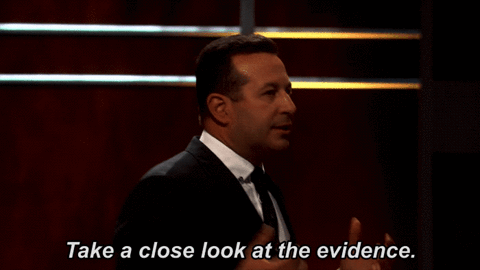Midterm season is upon us. Students are tucking themselves away to gear up for exams, research papers, and lab tests.
Now, I hate to be the bearer of bad news, but that’s not all they’ve got going on. For students with campus jobs, evaluation season is also around the corner. And although your student staff members don’t have to spend hours preparing for their evaluation, job reviews can still prompt uneasiness.
So, it’s my goal to equip you with tips and tricks that will make your student staff feel a little less dread, and a little more hope.
10 Tips
1. Give your students plenty of notice
If possible, give them at least two-weeks notice that their evaluation is approaching. This way, they can mentally and emotionally prepare.
It’s also an opportunity for them to really shine in the role leading up to the meeting. It’s best to evaluate students when they’re on their A-game rather than when they’re operating at their worst (such as in the thick of a stressful midterm season).
2. Encourage self-assessment

Provide your students with a copy of the evaluation form. Then, ask them to fill it out themselves and bring it to their meeting with you. This reflection exercise will not only get them into a growth mindset but also allow them to advocate for themselves during the evaluation.
I know there have been times when I’ve dinged an RA for not meeting their programming requirements, only for them to remind me of a passive program I’d forgotten. If you have a lot of staff members, it’s easy to get them jumbled. So, give your students the opportunity to showcase their best work.
3. Align the position description with the evaluation
You can’t score a staff member based on unknown expectations. So, make sure your expectations are clear by adapting bullet points from the position description into the evaluation form.
For example, if the job description says that the student is required to “provide the highest level of customer service to students and families,” your evaluation form could read, “Student staff member provides thorough and commendable customer service while working the front desk” — followed by a “below,” “meets,” or “exceeds” expectations marker.
You can do this with soft skills, too. If, for example, you are asking that your student staff maintain a positive, can-do attitude, spell out exactly what that entails on the evaluation form so you can talk through the mindset by which they approach their role.
4. Avoid surprise feedback
If your student has not been meeting job expectations, their evaluation should not be the first time they hear about it. Student staff should be held accountable on a rolling basis so that they’ll continually set and work toward new goals.
If something happens in the two weeks before the review, though, that is certainly something worth discussing during your evaluation season, even if it hasn’t been brought up in another capacity yet. Timeliness of feedback is key.
5. Know their preferred feedback style
Compliment sandwich? Clear cut? Spend some time understanding how your student likes to receive feedback by asking them directly or by taking cues from earlier accountability conversations.
You’ll want to use that method in your meeting. When you meet your students where they are, they are more likely to receive your feedback well.
6. Use examples

If your student is behaving below expectations in any area, you should be prepared to articulate how that’s so.
Are they chronically late to duty shifts? Then point out the emails or text reminders you had to send to ensure their on-time arrivals. Did they not fulfill the professional development requirements for the semester? Show them that you did not receive completion certificates. Are they lacking creativity? It might be helpful to talk about the two bulletin board templates they’ve been rotating month to month.
Conversely, if they are exceeding expectations in an area, highlight their above-and-beyond work. For example, explain how their initiative to plan staff development activities contributed to their exceptional teamwork score. Or, let them know that you’ve noticed how often they picked up shifts for their fellow colleagues and mark the “exceeds” category for the part of the evaluation that mentions staff support.
When students simply meet expectations, you should be prepared to provide the same level of insight. This should be your baseline so that any “below” or “exceeds” expectations are scored equitably among staff.
7. Set clear goals
Once you’ve reviewed their self-evaluation and completed your supervisor evaluation, it’s time to set some goals.
This can be done in a few different ways. You can look at areas in which your student is not yet exceeding expectations and explain what actions they’d need to take to hit that marker. Or, you can simply set a few S.M.A.R.T. goals that encapsulate the evaluation in totality.
8. Leave room for questions
Be willing and eager to provide clarity by leaving 10-15 minutes at the end of your meeting for processing. Whether it’s clarification about a particular job requirement or addressing how you can better support them as a supervisor, work alongside your student so they leave the evaluation knowing that you want to see them succeed – and that you’ll get there together.
9. Acknowledge their personal circumstances
They are more than just student staff members; they’re humans. Just as we would want grace in our professional evaluations, we should offer the same. Be honest about your feedback but do so with an understanding and acknowledgement that unexpected life events and ongoing circumstances can (and do) impact job performance.
If you need some advice on how to strike this balance, read more about how to support student staff through times of uncertainty here.
10. Let them evaluate you
Our own supervisors traditionally review our performance in totality. However, it’s important to also take stock of how you’re serving your supervisees, and there is no better person to give that feedback than the supervisee themselves!
Take the supervisory aspects of your job description and put them into an evaluation form for your staff to fill out. They should bring it with them to their evaluation meeting so they can share their feedback after you’ve done their review. This will make the meeting feel like it was a collaborative effort to create a productive environment for all involved – them, you, and the population you’re striving to serve.

At the conclusion of your students’ evaluation, I hope they feel celebrated for the work they’ve done and challenged to continue to grow. The support should be palpable, next steps should be clear, and stress should be alleviated.
A completed and agreed-upon evaluation is ultimately the outcome, but role modeling a culture of approachability and mutual accountability might just earn you some extra credit.
We could all use some bonus points during midterm season, right?
What additional tips do you have for student staff evaluation? We’d love to hear from you @themoderncampus.





